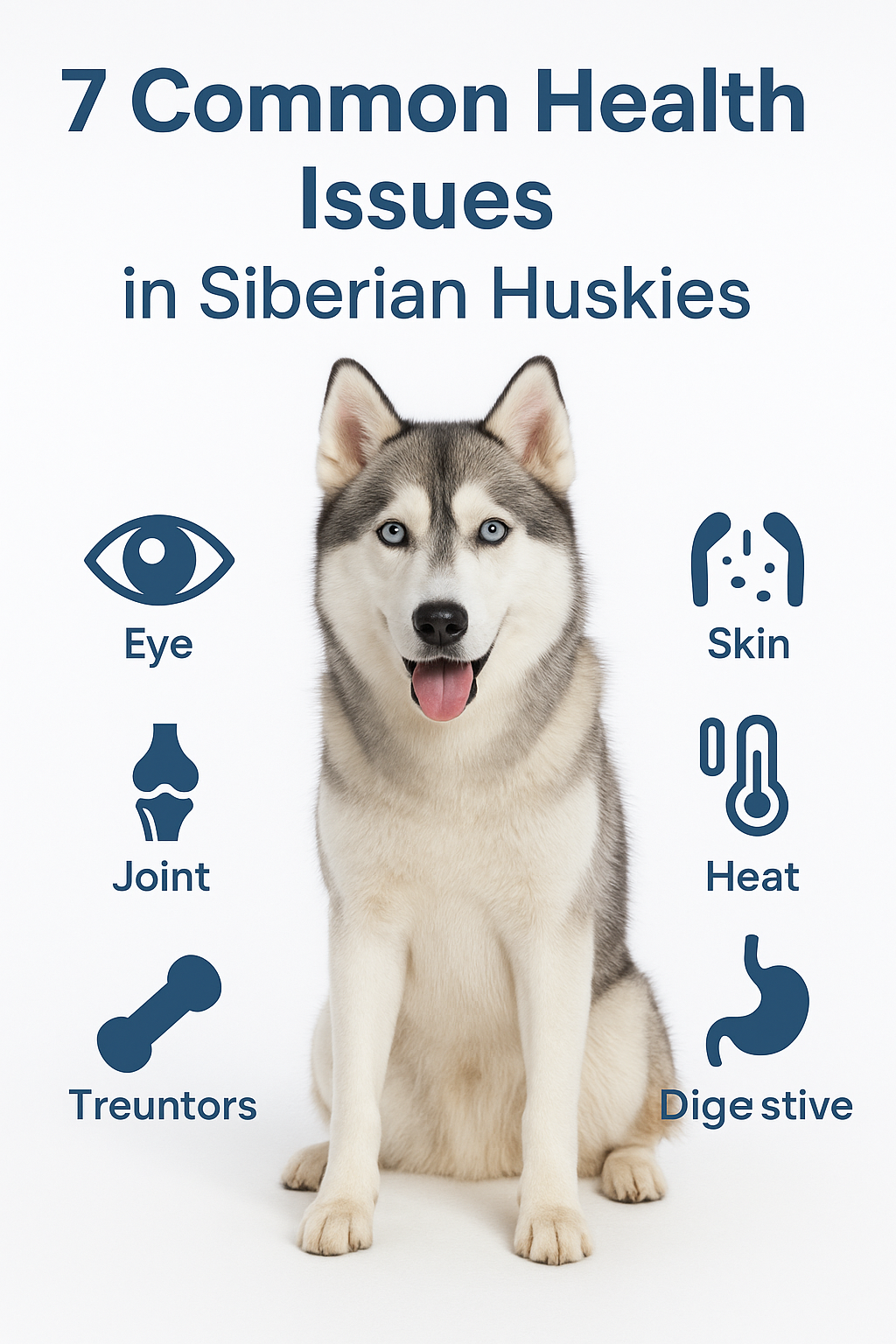
🐺 7 Common Health Issues in Siberian Huskies – Prevention and Care Tips
7 Common Health Issues in Siberian Huskies – Prevention and Care Tips
Hardy in Appearance, but Huskies Need Delicate, Specialized Care
The Siberian Husky is known for its wolf-like look, stamina, and independent nature.
However, due to their genetic makeup and cold-climate origins, they are prone to several health issues, particularly involving the eyes, skin, joints, and heat sensitivity.
This article outlines the 7 most common health issues in Siberian Huskies, along with practical prevention and care strategies.
⚠️ 7 Common Health Issues in Siberian Huskies
1. Cataracts
Siberian Huskies are genetically predisposed to developing cataracts at a young age.
-
Symptoms: clouded eyes, bumping into objects, decreased vision
-
Prevention: eye health supplements, regular eye exams
-
Treatment: cataract surgery
2. Glaucoma
Glaucoma causes elevated intraocular pressure, which can lead to permanent blindness.
-
Symptoms: eye redness, excessive blinking, pawing at the face
-
Prevention/Care: early diagnosis, eye pressure medications
3. Autoimmune Skin Disorders
Huskies are prone to autoimmune skin conditions, such as sebaceous adenitis and alopecia.
-
Symptoms: bald patches, redness, scaly skin
-
Prevention: high-quality, hypoallergenic diet; routine moisturizing baths
-
Treatment: steroids, antihistamines, immunosuppressive medications
4. Hypothyroidism
This hormone disorder affects energy levels, coat condition, and weight.
-
Symptoms: lethargy, hair thinning, unexplained weight gain
-
Diagnosis: blood work
-
Treatment: daily thyroid hormone medication
5. Hip Dysplasia
Large, active breeds like Huskies are susceptible to joint issues due to poor hip formation.
-
Symptoms: limping, reluctance to move or climb stairs
-
Prevention: genetic screening, weight control
-
Treatment: joint supplements, water therapy, surgical options
6. Heat Sensitivity and Dehydration
Huskies evolved in cold climates and are poorly adapted to hot, humid environments.
-
Prevention: avoid mid-day walks, always provide fresh water
-
Care: use cooling mats, offer ice cubes, keep air conditioning on during summer
7. Digestive Issues
Siberian Huskies often have sensitive stomachs and react poorly to sudden dietary changes or stress.
-
Prevention: consistent feeding schedule, no human food
-
Care: probiotics, fiber supplements, digestive enzymes
🛡️ Health Care Tips for Siberian Huskies
-
Avoid heat exposure and walk during early morning or evening
-
Add omega-3 and antioxidant-rich foods for eye and skin health
-
Provide low-impact but regular exercise
-
Schedule regular vet exams, especially for skin and eyes
-
Use high-quality, limited-ingredient kibble
🛒 Recommended Health Products for Huskies
-
Eye health supplements (lutein, astaxanthin)
-
Hypoallergenic shampoo and skin moisturizers
-
Cooling mats and joint support supplements
-
Digestive probiotics and sensitive stomach formulas
👉 View Products for Siberian Huskies
External Link (DoFollow)
Reference: AKC – Siberian Husky Breed Health
Internal Link
👉 Related article: Common Health Issues in Chihuahuas – Prevention Guide
🧩 Frequently Asked Questions (FAQ)
Q1. Why are Huskies sensitive to heat?
A1. They were bred in Arctic climates and lack heat tolerance. Provide cool, shaded environments at all times.
Q2. Are Huskies genetically prone to eye conditions?
A2. Yes, cataracts and glaucoma are common genetic issues. Regular checkups with a vet ophthalmologist are highly recommended.
Q3. Why does my Husky often have skin problems?
A3. Huskies are vulnerable to autoimmune skin conditions and need high-quality food and routine skin care.
👁️ Best Foods for Eye Health in Siberian Huskies
Due to their genetic predisposition, Siberian Huskies are highly susceptible to eye conditions like cataracts and glaucoma. Incorporating eye-friendly nutrients into their daily diet can help support and protect their vision.
Here are some of the best foods and supplements that promote eye health in Huskies:
1. Blueberries
Rich in antioxidants like anthocyanins, blueberries help neutralize oxidative stress in the eyes and may slow down age-related vision problems.
-
Serving Tip: Use as a treat or add a few to their kibble (fresh or freeze-dried)
2. Carrots
Packed with beta-carotene (a form of Vitamin A), carrots support retinal health and night vision.
-
Serving Tip: Steamed or finely chopped raw
3. Spinach and Kale
Leafy greens are full of lutein and zeaxanthin, two key antioxidants that protect the eye’s retina from damage.
-
Serving Tip: Lightly steamed, mixed into food
4. Salmon and Sardines
Oily fish are excellent sources of omega-3 fatty acids (DHA and EPA), which reduce inflammation and support overall eye function.
-
Serving Tip: Cooked plain (no salt or oil) or use fish oil supplements
5. Eggs
A great source of zinc and lutein, eggs contribute to reducing the risk of macular degeneration.
-
Serving Tip: Hard-boiled or scrambled without seasoning
6. Pumpkin
Rich in Vitamin C and E, which help strengthen eye tissue and slow oxidative damage.
-
Serving Tip: Plain, unsweetened canned pumpkin or cooked fresh
🛒 Recommended Supplements
-
Lutein & Zeaxanthin Complex
-
Fish Oil Capsules for Dogs
-
Vitamin A + E Soft Chews
👉 Shop Eye Health Supplements for Huskies
⚠️ Note
Always introduce new foods gradually and consult your veterinarian before making dietary changes, especially if your Husky already has an eye condition or food allergies.

